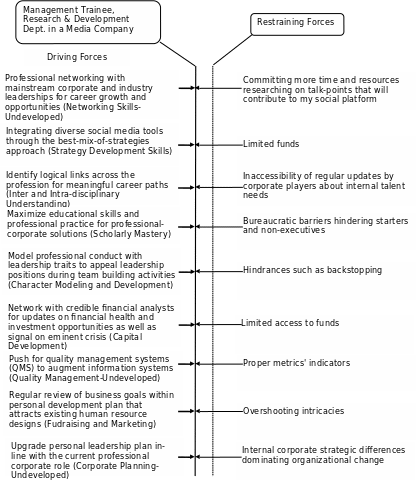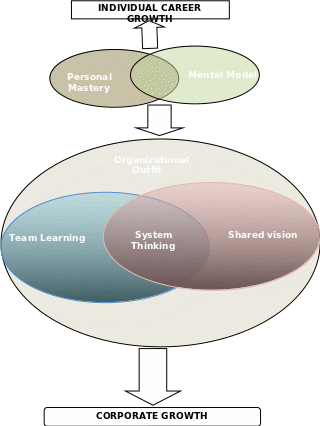
With regard to the force field analysis, the driving forces are those that influence (that is, push) a positive change; such as enhancing the corporate productivity and individual creativity (Accel-Team, 2012). On the other hand, restraining forces act to decrease the pace or halt progress of the driving forces (Accel-Team, 2012).
Being a management trainee, personal mastery is a reflection of the degree of complexity of assignments accomplished. This means, the desire to remain relevant to the company or climb to higher positions depends on maintaining a personal vision within the immediate company needs. Actually, remaining contented or fear to take-up new career opportunities or responsibilities pose an indifferent feeling (May, 2012). Indifference is demonstrated towards low personal self-confidence and self-esteem.
This should not be construed that individual mastery is completely controlled by the immediate environment. However, the need to cease the opportunity and proof worth by providing the desired solutions to immediate corporate challenges will always present the metrics to test changes in professional conduct and skill. That is why there is a need for continuous clarifying of personal vision, especially to weather down self-induced barriers (May, 2012).
The positive correlation between self-esteem and personal growth resulting from well crafted mastery will instill self-confidence. Thus, there exists a cyclic of events upon which mastery indicators can be set for continuous self-evaluation for improvement. Arguably, being an achiever will not be instantaneous but progressive, especially for starters. Thus, personal mastery does not purely depend on talent and intelligence quotient (IQ) but rather rigorous innovation and creativity for industrial solutions (May, 2012).
This is true considering that every technology in the market has its own restraining factors. Remaining appreciative of individual achievements against a backdrop of setbacks gives the impetus to go for new challenges without despair. Thus, learn from the past and use it as an asset for better achievement.
Mental models for career growth, especially within the research and development depends on the skills that balance inquiry and advocacy (May, 2012). Providing the necessary assumptions made in the interest of others when making an inquiry will present an optimal opportunity to advance (or advocate) individual views, while encouraging others to always give priority to your view. When others continue to explore your view this promotes career growth through learning new perspectives presented as challenges and leverages (Childress, 2007).
An example of a model to illustrate this, the board-of-directors comprised of interdisciplinary professionals who influence an executive. The board-of-directors present diverse suitable professional perspectives that intend to instill uniform developmental skills to an organization but through the executive.
At the end, others will measure achievement (growth) by the contributions made individually (May, 2012). Thus, mental models are intra- and interdisciplinary; though effective when assessed from a personal than a corporate approach.
Considering that shared vision is palpable, this can leverage individual agenda and contribute towards shaping the company’s identity and image. Identifying how personal mastery will augment the collective effort and commitment brings on board the aspirations to focus on the long term proactively rather than reactively (May, 2012).
Skills that define shared vision depend on the homogeneity of personal mastery between and within individuals, more so under a corporate umbrella. Individual visions drive mastery (May, 2012). Since the personal mastery boosts self-confidence and self-esteem thus sharing vision with an elite group, one may end up rewarded as a proponent or supporter through a job promotion.
In essence, the bases of the reward will not be because of a shared idea but to appreciate an individual as a driving force for the long-term achievements. It is important to develop a personal vision and continuously weigh against colleagues for contrast purposes. Points of convergence could present opportunities for discovering how to overcome conflicts when developing a corporate strategy (May, 2012).
On board an elite group, a management trainee will benefit from team learning since solutions are based on dialogue. Dialogue assumes people genuinely enter into thinking together. The concept of dialogue focuses on the collective concern on corporate learning. Gains made at the individual level, should be reflected on each member regardless of personal rank across the management spectrum. In team learning, everybody has the opportunity to make a meaningful contribution and impact on the others.
This makes difficult issues simpler because of collective concern (Doubleday, 1990). In such a system the company will reward individuals based on their job experience than scholarly performance. The premise is that one has participated within the team for a long time and deserves a promotion.
Assumptions that individuals fail to achieve breakthroughs yet using sophisticated tools is because designs applied are meant for complex settings where many variables are operating (Kagan, 2003). When such challenges are faced then this is detail complexity; however in the case of cause and effect it is called dynamic complexity (Kagan, 2003).
Priority for understanding should be given to the dynamic complexity since this gives a leverage to manage a situation, thus averting crisis. Undertaking situation analysis provides the opportunity to understand the detail complexity, though it is not that automatic.
In system thinking, mapping oneself for career growth depends on whether you are appreciated or not. This is indicated by whether you are happy about the system or not (Kagan, 2003). In most cases, those lacking happiness will seek elsewhere to advance their desires.

References
Accel-Team (2012). Productivity Improvement. Web.
Childress, K. (2007). Reaping the Rewards of Personal mastery. Web.
Doubleday, C. (1990). The Fifth Discipline. Web.
Kagan, S. (2003). Peter Senge, The fifth discipline. Web.
Lewis, J., Packard, T. and Lewis, M. (2007). Management of human service programs. Belmont: Thomson.
May, K. E. (2012). Work in the 21st Century: Career Development. Web.